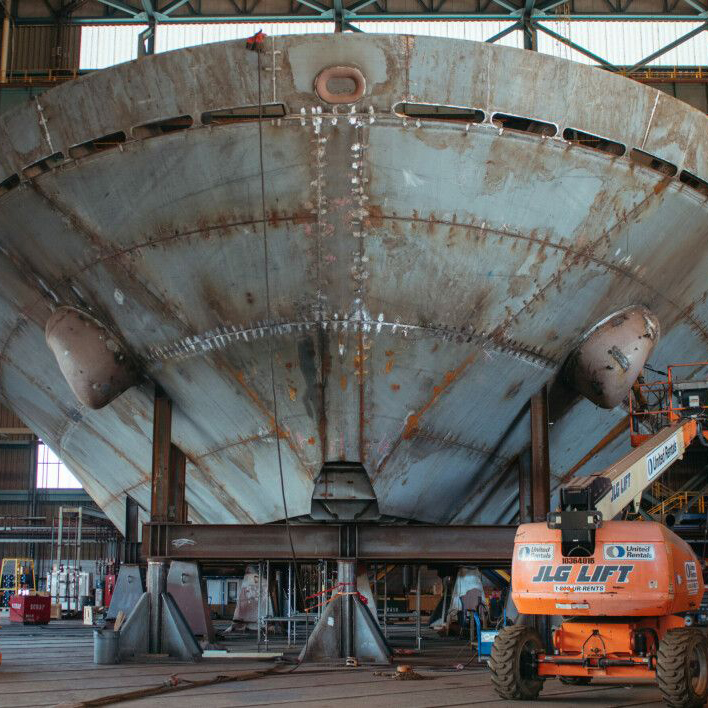Pressure Vessel Steel
Pressure vessel steel plates are engineered materials optimized for storing pressurized gases or liquids in critical infrastructure like boilers, heat exchangers, and storage tanks. These plates require precise material characteristics:
Introduction
Container steels are specialized materials engineered for manufacturing pressure vessels, storage tanks, and equipment operating in extreme temperatures (-196°C to +600°C) or corrosive environments. These steels are critical in industries such as oil and gas, petrochemicals, nuclear energy, and cryogenic storage. Key attributes include high strength, excellent weldability, corrosion resistance, and low-temperature toughness.
General Equivalent Grade of Pressure Vessel Steel
Below is a comprehensive matrix of globally recognized container steel grades, categorized by application and temperature range:

Technical Specifications
1. Chemical Composition & Mechanical Properties
- Low-Temperature Grades (e.g., 16MnDR):
- C: ≤0.20%, Mn: 1.20–1.60%, Si: 0.15–0.50%
- Yield Strength (ReL): 265–315 MPa (thickness-dependent)
- Impact Toughness: ≥47J at -40°C (Charpy V-Notch).
- High-Temperature Grades (e.g., 12Cr2Mo1VR):
- Cr: 2.00–2.50%, Mo: 0.90–1.20%
- Tensile Strength (Rm): 570–720 MPa (at 600°C).
- Hydrogen Resistance: HIC/SSCC tested for sour service.
2. Heat Treatment & Processing
- Delivery Conditions:
- Normalized (N), Normalized + Tempered (NT), or Quenched & Tempered (QT) for enhanced grain refinement.
- Advanced Manufacturing:
- Smelting: EAF/BOF with LF/VOD refining for ultra-low S/P (≤0.005%).
- TMCP (Thermo-Mechanical Controlled Processing): Optimizes thickness uniformity in plates up to 200mm.
3. Testing & Certification
- NDT (Non-Destructive Testing):
- Ultrasonic Testing (UT) for plates >20mm (per GB/T 2970 or NB/T 47013.3).
- HIC/SSCC testing for hydrogen-containing environments.
- Certifications: Compliant with ASME, PED, ISO 9328, and GB/T 713.
Applications
1. Energy & Petrochemicals
- LNG Infrastructure: 16MnDR for -162°C LNG storage (thickness: 16–50mm).
- Hydrogenation Reactors: 12Cr2Mo1VR with 120mm thickness, validated at 470°C.
- Offshore Platforms: SA516 Gr.70 (Q345R equivalent) for marine corrosion resistance.
2. Power & Nuclear
- Nuclear Pressure Vessels: 07MnNiCrMoVDR (-196°C impact toughness ≥80J).
- Boiler Components: 15CrMoR for high-temperature steam pipelines (550°C).
3. Chemical Processing
- Acetic Acid Reactors: SA387 Gr.11 CL2 (15CrMoR equivalent) with anti-corrosion cladding.
Selection Guide
Selection Criteria
- Low-Temperature: 16MnDR (-40°C) or 09MnNiDR (-70°C).
- High-Temperature/Hydrogen Service: 12Cr2Mo1VR (HIC-resistant) or 14Cr1MoR (sulfide corrosion resistance).
- Marine/High-Corrosion: SA516 Gr.70 (offshore) or duplex steels (e.g., S32205) for chloride-rich environments.
Production & Customization
1. Manufacturing Capabilities
- Dimensions: Thickness 8–200mm, width 1,500–4,100mm.
- Special Processing:
- Z-Directional Properties: Z15/Z25/Z35 certification for anti-lamellar tearing.
- Precision Cutting: Plasma, laser, or waterjet cutting for complex geometries.
2. Quality Assurance
- Traceability: Mill test certificates (MTC) with heat-specific chemical/mechanical data.
- Inventory: 10,000+ tons of ready stock for urgent orders (15-day lead time).
















